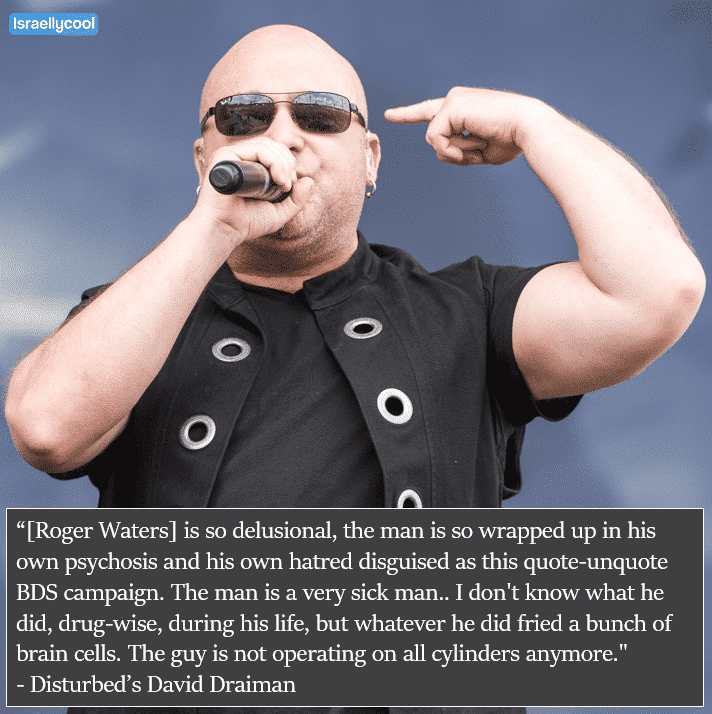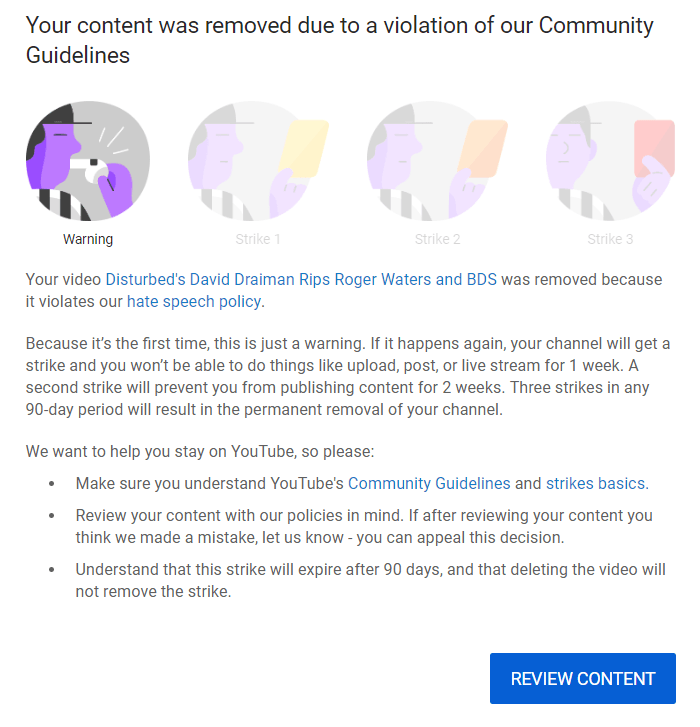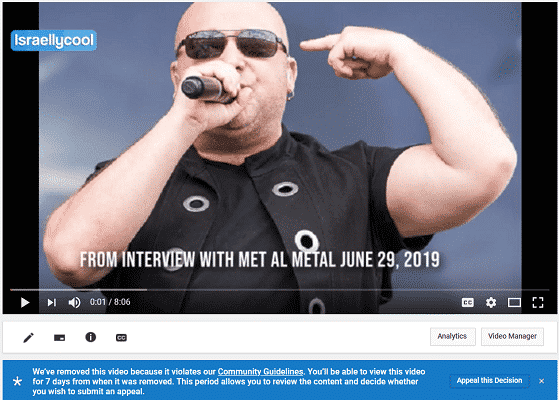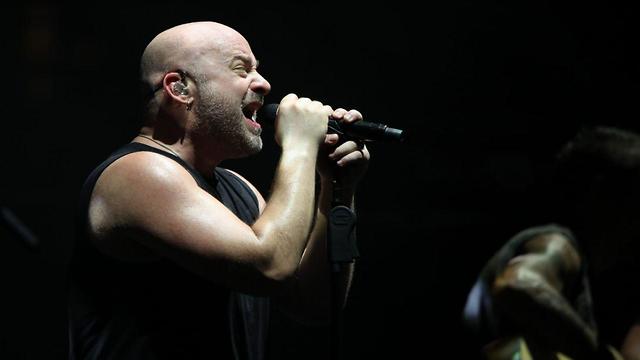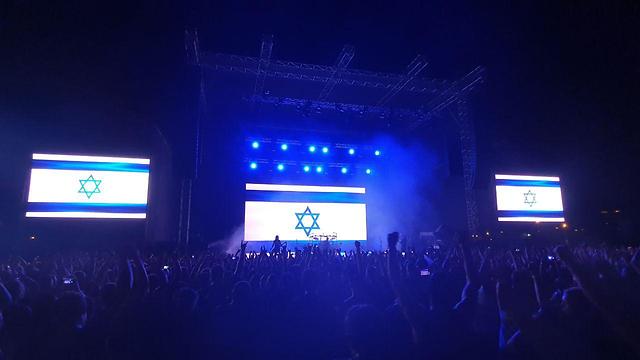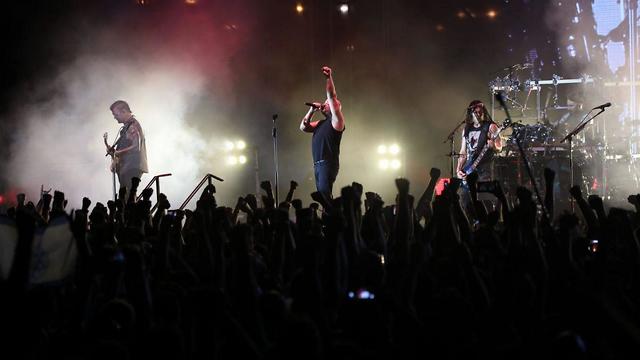David Draiman, frontman for the incredibly popular band Disturbed, is not what you might expect from a rocker. Incredibly intelligent, articulate, and devoted to his family, David is also a proud Jew not afraid to speak out in defense of Israel and the Jewish people.
I recently spoke with David about his background, advocacy, Roger Waters, music…and even aliyah.
You went to a very religious high school, but got kicked out after rebelling…
DD: I went to several very religious high schools. There were five in total. I was asked to leave three of them. One I left of my own volition, and the last I ended up somehow staying at and lasting.
According to interviews I have seen, some of your indiscretions included possessing a GQ Magazine, throwing a classmate from a second-story window, and setting fire to and blowing up the Rabbi’s van. Which of those was the straw that broke the camel’s back?
DD: Well, two of those happened at the same place, and they couldn’t prove the whole fire and explosion thing. I will continue to conveniently plead the 5th on that until the end of time.
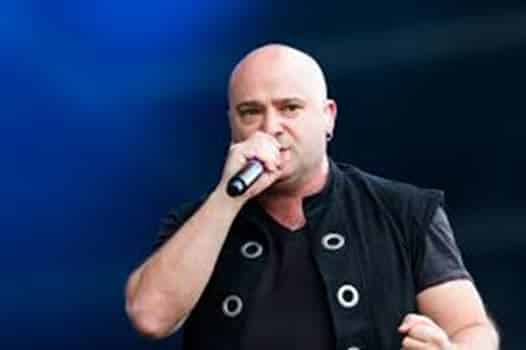
But the GQ thing was kind of what they hung their decision on, to ask me to not return.
GQ is Gentleman’s Quarterly, a horrible magazine, which G-d forbid has advertisements in it with women wearing lingerie or something, that might force me to want to commit horrible sins.
Like it might lead to dancing.
DD: It might lead to dancing, yes.
But it would be a mistake to think just because you got into trouble, you were a bad student. In fact, you got excellent grades and got accepted into a bunch of law schools. Why didn’t you want to become a lawyer in the end?
DD: After I had finished my bachelor degrees, and it was a matter of taking the LSATs and I did very well. As you said, I got into several different law schools. And the only type of law that interested me was criminal defense. But I had a very serious conflict of conscience, where I couldn’t really come to terms with having to defend someone who I knew was guilty. Yet that was the only type of law that really interested me.
After this crisis of conscience of sorts, I started looking for some other options. Within two years, I was running my own healthcare facility.
You have been one of the most outspoken celebrity supporters of Israel and the Jewish people and perhaps one of the most outspoken supporters full stop. Do you think in a way, you are fulfilling the desire to be an advocate that may have first attracted you to law, but in this case you are defending a client you believe in, so to speak?
DD: Interesting. I mean, I do love debate. I have my many, many years of studying Jewish law. Studying Gemara and the Talmud in general, and being able to go back and forth, and whittle down the finer points of an argument. Trying to win on the merit of the argument itself, as opposed to the fervor and the fire that you muster behind it. It is always a welcome challenge for anyone who truly enjoys the heart of what debate is.
It is definitely a side of mine I yearn to satiate. And it is not always easily sated in the line of work I am currently in.
But it used to be quite sated when you were on Twitter, and your debating skills really came to the fore. You were a really effective advocate, and I was really, personally upset when you left the platform around 4 or so years ago. Why did you leave Twitter?
DD: The reasons are the same reasons, whether it’s you or any number of pro-Israel advocates – having to deal with the amount of blatant antisemitism that is swung at you guys on a regular basis. You take somebody in my position, and you end up amplifying it a thousand times. Things like death threats become very tangible and very real when you are a public person whose movements and schedule are public domain. It becomes very dangerous.
For a very long time it was a matter of doing what I can “under the table” – stuff I have been doing with
Creative Community for Peace. How can you not be an advocate for Israel when your entire family basically lives there?
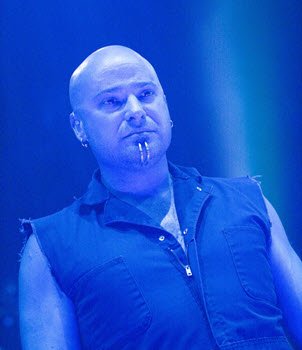
The ridiculousness of the whole thing is that there isn’t a single country on the face of the Earth that is held to the same standard that Israel is. You have the most venomous and the most inherently evil and self-serving dictators on the planet that sit on the UNHRC. That are continuing this farce of trying to deceive the world into thinking that they have any real care for human rights of any kind.
You have the Chinese putting their Muslims into concentration camps. You have the Venezuelan people being brutalized, you have atrocities being committed across the African continent. You have the constant human rights atrocities committed among Russian society, whether it’s attacks on their LGBTQ community, or any number of other attacks. But the only country, the only people in the world that seem to be worthy of a campaign that is specifically targeted towards the entire country – not the actions of the government, but the entire society and people living in it – is Israel. And you have to wonder why that is.
We know the answer.
That’s actually a really good segue into my next question. You were one of the first, if not the first, celebrities to call out Roger Waters for antisemitism. Did you get any blowback for that, either from Waters or any of his minions? I am guessing even if you did, you didn’t really care since you just ripped him again.
DD: Why would Waters actually want to engage in conversation?
I think I can very effectively separate standing up for the existence of a country that my entire family resides in, and not having to mix it with what we do as a band. I think music is something when it is time for you to perform, to provide that outlet for people to escape, it isn’t necessarily the opportunity to stand at the podium and start preaching any type of politics, in my humble opinion. People come to concerts to get away from that sort of thing.
When thousands of people standing next to each other all of a sudden find themselves singing together words that they all know and songs that they all love, everything else doesn’t matter. It is the power of music.
And obviously Roger Waters never got that memo.
DD: It’s so painful to me personally because I’m a massive fan of his work. That’s the tragedy of it. I think that the artists in Pink Floyd are some of the most amazing songwriters and crafters of music that ever lived. And for him to weaponize his art, for him to take it to this place where every antisemitic conspiracy theory in existence is suddenly brought front and center…and you get this madman raving about the power of these people he won’t label as Jews but will label as anything else that basically has the same meaning as Jews, saying they are behind all of the evils of the world or are pulling the strings of all the real power brokers in this world, it’s standard antisemitic conspiracy theory 101. It’s frightening stuff and it’s heartbreaking because I love Pink Floyd’s music as much as anyone.
What I don’t love is Roger Waters’ lunacy.
Can you still listen to Pink Floyd or can’t you stomach it anymore?
DD: I personally won’t do it anymore in my spare time or, truth be told, even if one of the songs comes on a class rock station on the radio, I tend to skip past it. It’s really just poisoned the well for me.
One of the things that’s classically said when it comes to people you look up to and idolize is never meet your idols. Never actually come face-to-face with them because you may be disappointed.
Given that my father, mother, brother, and 2,000 or 3,000 other cousins, uncles and relatives still live in the state of Israel, whose existence is being directly threatened by his campaign, does that affect my judgment or enjoyment level of the art he has created? Unfortunately it certainly does.
Wow, did you say 2,000 or 3,000 relatives in Israel?
DD: It’s insane.
People don’t realize the extent of my family’s history in Israel. It’s pretty insane. My grandfather and grandmother were both in the Haganah. They both were freedom fighters trying to create Israel into existence when the British mandate was still in force. My grandfather was a paratrooper, my father was a paratrooper, my grandmother was on the cover of Haisha, one of those iconic covers where’s she holding a sub machine gun. My family was very connected with Israel culture in general. My grandfather was editor-in-chief of
Hamodia for many years. My family built the
Jerusalem Pearl Hotel, which now unfortunately is standing vacant right outside of the Jaffa Gate.
Our history with Israel as a family is extensive, and it’s something I’m very proud of.
What about your fellow Disturbed band members. Are they even interested in the Middle East conflict? Is this something that through you, has rubbed off on them?
DD: My guys are not really into it, but they have definitely gained an appreciation for Israel, and they have certainly gained a greater understanding. They are going to spend a few extra days with me in Israel after the performance. We are planning on going to the old city together, to Jerusalem to tour; I am going to take them to Masada, and Ein Gedi, and the Dead Sea…old Jaffa while we are in Tel Aviv, and show them the Tel Aviv nightlife. They’re interested enough to not make it a short-term stay, knowing they have someone like me to show them around, who kind of knows what he’s doing.
What about the fans? Has your advocacy ever come up with fans, either in a positive or negative way?
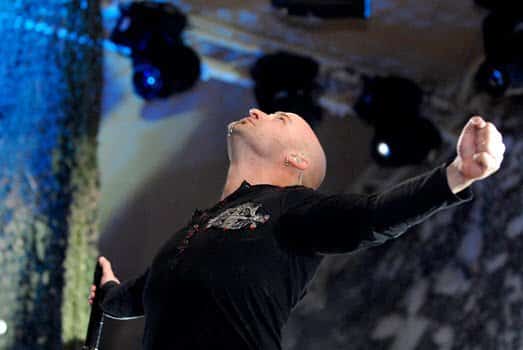
DD: Most of the personal reactions I’ve had, in regard to this particular subject matter if it happens to come up, have been far and away positive. I think I can count on one hand the number of instances where there has been someone who had – I don’t know how else to say it – the
chutzpah to, in knowing where I come from, my heritage, and how much family I have who reside in Israel, to have the gall to come up to me and start talking anti-Israel and antisemitic rhetoric. It is going to be a very short conversation.
Disturbed has released seven studio albums, five of which have consecutively debuted at number one on the Billboard 200. You’ve also received 5 awards from 23 nominations, including two Grammy nominations, and one Billboard Music Award nomination. Yet some people out there (including journalists), seem to think your main claim to fame is your rendition of the Sound of Silence. Is that annoying to you, given your body of work and accomplishments, or are you glad you seem to have reached a new audience with that song?
DD: I’m thrilled for any or all of it, to be perfectly honest. I don’t look a gift horse in the mouth, and I am aware as anyone of the incredible blessing that the success of our cover of the Sound of Silence was. Nobody expected it, and truth be told, for people who are not harder rock or metal world people, they’re right. The crossover, mainstream exposure we’ve had was that cover, so they’re not wrong. That is the song that helped us cross over to other demographics in a big way.
Prior to that cover, they would say our main claim to fame would have been our first big hit
Down With The Sickness.
You are performing one concert here on July 2nd. Will there be any special surprises for the Israeli audience, beyond the usual stuff?
DD: Without a doubt. I can’t give away too much. I don’t want to make it not be a surprise any more.
Everyone can automatically assume given my heritage and history that it is definitely going to be a very special night.
Not to spoil any surprises – I do not know what you have planned – but you’ll be speaking a bit of Hebrew, that’s for sure.
Do you ever see yourself retiring and possibly making aliyah (immigrating to Israel), or at least living here part-time?

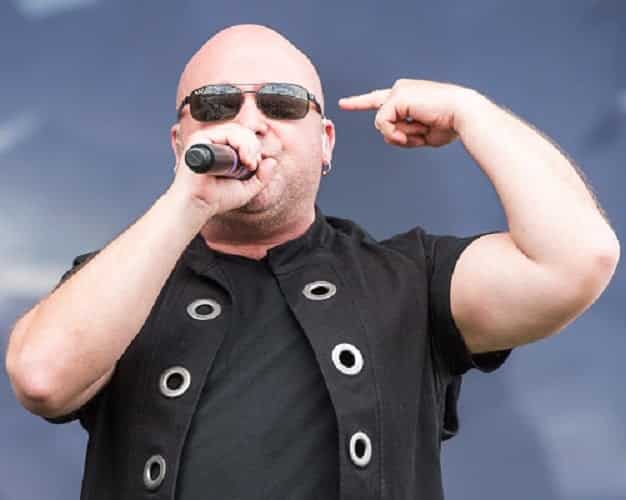 “The man is so delusional, the man is so wrapped up in his own psychosis and his own hatred disguised as this quote-unquote BDS campaign,” the DISTURBED singer said. “The man is a very sick man.
“The man is so delusional, the man is so wrapped up in his own psychosis and his own hatred disguised as this quote-unquote BDS campaign,” the DISTURBED singer said. “The man is a very sick man.